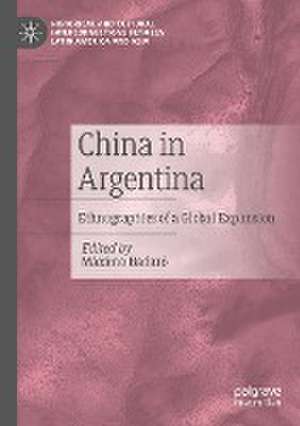China in Argentina: Ethnographies of a Global Expansion: Historical and Cultural Interconnections between Latin America and Asia
Editat de Máximo Badaróen Limba Engleză Paperback – 2 feb 2023
| Toate formatele și edițiile | Preț | Express |
|---|---|---|
| Paperback (1) | 774.67 lei 6-8 săpt. | |
| Springer International Publishing – 2 feb 2023 | 774.67 lei 6-8 săpt. | |
| Hardback (1) | 779.89 lei 6-8 săpt. | |
| Springer International Publishing – feb 2022 | 779.89 lei 6-8 săpt. |
Preț: 774.67 lei
Preț vechi: 944.72 lei
-18% Nou
Puncte Express: 1162
Preț estimativ în valută:
148.24€ • 153.16$ • 123.31£
148.24€ • 153.16$ • 123.31£
Carte tipărită la comandă
Livrare economică 19 martie-02 aprilie
Preluare comenzi: 021 569.72.76
Specificații
ISBN-13: 9783030924249
ISBN-10: 3030924246
Pagini: 172
Ilustrații: XV, 172 p. 20 illus.
Dimensiuni: 148 x 210 mm
Greutate: 0.23 kg
Ediția:1st ed. 2022
Editura: Springer International Publishing
Colecția Palgrave Macmillan
Seria Historical and Cultural Interconnections between Latin America and Asia
Locul publicării:Cham, Switzerland
ISBN-10: 3030924246
Pagini: 172
Ilustrații: XV, 172 p. 20 illus.
Dimensiuni: 148 x 210 mm
Greutate: 0.23 kg
Ediția:1st ed. 2022
Editura: Springer International Publishing
Colecția Palgrave Macmillan
Seria Historical and Cultural Interconnections between Latin America and Asia
Locul publicării:Cham, Switzerland
Cuprins
Chapter 1 Introduction. China in Argentina: ethnographic perspectives of a global expansion.- Chapter 2 “Today we are all Chinatown”: identity struggle and strategic uses of culture in Buenos Aires' Chinatown.- Chapter 3 “The language of the future”: Mandarin Chinese as cultural identity and merchandise in an Argentine-Chinese bilingual school in Buenos Aires.- Chapter 4 “This is not Chinese food”: relocation, authenticity and global cuisines in Chinese restaurants in Buenos Aires.- Chapter 5 “Chinese medicine is not just acupuncture”: the experience of Chinese immigrants in the Argentinian healthcare system.- Chapter 6 Avoiding encounters: an ethnographic analysis of Sino-Argentine business relationships in Argentina’s oil industry.- Chapter 7 “Now is all about China”: recent developments in Chinese Studies in Argentina.
Notă biografică
Máximo Badaró is Researcher at the National Scientific and Technical Research Council (CONICET, Argentina) and Professor of Social Anthropology at the Universidad Nacional de San Martin (UNSAM, Argentina), where he is also the director of the Bachelor Degree Program in Social Anthropology.
Textul de pe ultima copertă
“These richly empirical essays enable us to understand China’s ongoing experiments in engaging with the global capitalist economy by focusing on how the dynamic forces at work in Chinese-Argentine interactions arise through their encounters with one another rather than being solely imposed on them by a structural outside. They reveal the breadth and diversity of actors and types of enterprises, the multiplicity of those who make claims about the 'way things are done' by Chinese; and the economic inequalities in which Argentinians are not mere passive recipients. Anyone who seeks to gain a richer appreciation of China’s heterogeneous global activities in the twenty-first century will need to read this book”.
—Lisa Rofel, Professor Emerita, University of California, Santa Cruz USA
This is the first book to shed light on the growing presence, influence and expansion of China in the daily life of Argentina. While most previous academic studies focus on the geopolitical and macroeconomics dimensions of the relations between Argentina and China, this book shows at a micro-social level the multiple facets of the economic, political and social influence of China in Argentina. The book presents ethnographic studies of encounters of actors and negotiation of identities from Argentina and China in companies, schools, restaurants, hospitals, districts, public and private institutions in Argentina. Themes discussed in the ethnographies include: identity struggle and strategic uses of culture in Buenos Aires' s Chinatown; teaching Chinese as the first foreign language or teaching it as a heritage language in a bilingual school; the contested production of images of Chinese authenticity in Chinese restaurants; the connections and contestations between so-called “Western medicine” and so-called “Chinese Traditional Medicine”; and the conflictive relations between Chinese expatriate bosses of Chinese state-owned enterprises and their Argentinean employees.
Máximo Badaró is Researcher at the National Scientific and Technical Research Council (CONICET, Argentina) and Professor of Social Anthropology at the Universidad Nacional de San Martin (UNSAM, Argentina), where he is also the director of the Bachelor Degree Program in Social Anthropology.
—Lisa Rofel, Professor Emerita, University of California, Santa Cruz USA
This is the first book to shed light on the growing presence, influence and expansion of China in the daily life of Argentina. While most previous academic studies focus on the geopolitical and macroeconomics dimensions of the relations between Argentina and China, this book shows at a micro-social level the multiple facets of the economic, political and social influence of China in Argentina. The book presents ethnographic studies of encounters of actors and negotiation of identities from Argentina and China in companies, schools, restaurants, hospitals, districts, public and private institutions in Argentina. Themes discussed in the ethnographies include: identity struggle and strategic uses of culture in Buenos Aires' s Chinatown; teaching Chinese as the first foreign language or teaching it as a heritage language in a bilingual school; the contested production of images of Chinese authenticity in Chinese restaurants; the connections and contestations between so-called “Western medicine” and so-called “Chinese Traditional Medicine”; and the conflictive relations between Chinese expatriate bosses of Chinese state-owned enterprises and their Argentinean employees.
Máximo Badaró is Researcher at the National Scientific and Technical Research Council (CONICET, Argentina) and Professor of Social Anthropology at the Universidad Nacional de San Martin (UNSAM, Argentina), where he is also the director of the Bachelor Degree Program in Social Anthropology.
Caracteristici
Sheds light on the growing presence of China in Argentina Presents ethnographies of Argentina-China encounters Foreword by Lisa Rofel, a renowned specialist in China









